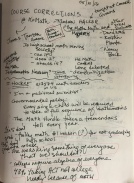From my notes
 I was afraid that when I went and looked back at my notes from last night’s conversation between James Tanton and Andrew Hacker, they wouldn’t make any sense. I bought the Sketchnote Handbook a few months ago, fantasizing that my notes would look like Ashli’s, but, alas, my creativity does not really extend into the note-taking dimension. But I am pleased to report that I was fairly organized and thorough, so I hope this post will give you something of the flavor of the evening.
I was afraid that when I went and looked back at my notes from last night’s conversation between James Tanton and Andrew Hacker, they wouldn’t make any sense. I bought the Sketchnote Handbook a few months ago, fantasizing that my notes would look like Ashli’s, but, alas, my creativity does not really extend into the note-taking dimension. But I am pleased to report that I was fairly organized and thorough, so I hope this post will give you something of the flavor of the evening.
After an introduction by John Ewing, President of Math for America, the participants were given alternating 15 minutes in which to speak and present their ideas. This was followed by a brief Q&A with the audience.
Andrew Hacker began the conversation by stating that the American governmental policy of requiring all children to take a full sequence of high school mathematics took a tremendous toll every year; failure of mathematics, he asserted, was the #1 reason students do not graduate high school. And then he posed a question which raised a whole bunch of exclusionary red flags for me: Are we asking something of everyone that we shouldn’t?
Low expectations, anyone?
Hacker referred to a statistic put forth by the American Diploma Project – that 62% of professions will require algebra at some point in the 21st century (my notes do not include the purported date – sorry). He asserted that this number was grossly inflated – by over 1200% – and that the figure was closer to 5%. We’ve created, he said, an oversupply of STEM-qualified people following this misguided notion. Hacker also claimed that there was no evidence that math sharpened the mind.
Hacker is no supporter of the hyper-testing environment we find ourselves in, and decries the biases in tests which skew results, on the PSAT for example, in favor of boys over girls. This bias, he said, was inherent in mathematics. (Silly me – I thought it was on the part of the test writers.)
He closed his first 15 minutes by saying that he wanted to see alternative mathematics courses for those students ‘who didn’t need algebra’, and offered, as a suggestion, a class that he taught through a mathematics department entitled Numeracy 101. He described this course as ‘not high-powered academics.’
Before I start writing about James Tanton, I have to issue a disclaimer. Dr. Tanton is an ‘Aussie fellow’, who speaks fluidly and quickly with a charming accent. As such, my notes on his portion of the conversation are sketchier, because (a) I was trying to keep up with him and (b) I didn’t have the kind of objections to what he was saying which would cause me to furiously record quotes as accurately as possible – quite the opposite, in fact.
James Tanton’s personal philosophy on math education is to joyously teach mathematics as a human story , rather than as a series of dry procedures. He talked about some of the goals of education, and mathematics education in particular – learning about patience and  problem-solving, and metacognition (how do you know what you know?). Tanton even asserted at one point that content was necessarily not the point in high school math (I hope I got that right, because I sort of agree), using the example of the He discussed the structure and goals of the Common Core standards – what they are (The Story of Math) and what they are not (a curriculum – YES, YES, YES), and the importance and extreme relevance of the 8 Math Practices.
problem-solving, and metacognition (how do you know what you know?). Tanton even asserted at one point that content was necessarily not the point in high school math (I hope I got that right, because I sort of agree), using the example of the He discussed the structure and goals of the Common Core standards – what they are (The Story of Math) and what they are not (a curriculum – YES, YES, YES), and the importance and extreme relevance of the 8 Math Practices.
When Hacker returned to the podium, he clarified that he didn’t object to the standards (although later on he said he did), but rather the testing of them, which would force teachers to teach to the test. (Because that’s not happening now.)
He talked about being on jury duty, and how knowledge of mathematics was not important to determining guilt or innocence, and shared an anecdote about an important insight (which did not require a math education) on a case shared with him by another juror – Jose the Bicycle Messenger, who had never seen the inside of a high school math classroom.
Yes, he said those words. I was almost done listening.
To finish his second presentation, Hacker displayed the names of four huge game-changing companies – Google, Apple, Twitter and Starbucks. He asserted that the power of these companies was not in their technology, but rather in their catchy and evocative names. He concluded that we don’t need math majors, or engineers – what we need is more poets.
It was a relief to this listener to have James Tanton finish the conversation by agreeing with Hacker’s stance on testing, and then paint a picture of the Story of Trigonometry – how it was born of the need – the desire – to determine how high the sun was, and how far away things were when tools of measurement were not highly developed. The big ideas of

geosaurus.tumblr.com
math were developed around the globe by different civilizations, each contributing to the larger picture. He made his case again for telling the human story of math, to fill it with the joy and wonder of discovery, rather than with dry and decontextualized procedures. (This echoed a point he made during his first presentation – that even though we may not have a reason to use the quadratic formula or completing the square professionally, learning about it has meaning if taught in a larger context – one in which algebra and geometry are interwoven and represent more than letters and disconnected algorithms.)
Just a couple of highlights from the Q&A, because this post is way too long, and this old lady needs to go to sleep:
- A teacher asked what either of the speakers would suggest that teachers do as we are caught in the middle of striving for meaningful math education and testing. Hacker, pointing out that this was a political question, suggested she write her congressman. Tanton, acknowledged the frenetic pace in the life of a high school teacher and admitted he didn’t have a solution. He encouraged us to develop our own professional communities – in person, and on-line through blogging and Twitter.
- Someone else wondered what the consequences of abolishing the Common Core standards might be; a teacher from the South Bronx suggested that eliminating the CCSS would widen the achievement gap.
- In Hacker’s response to these questions and thoughts, he decried the ‘one size fits all’ approach of the Common Core, and how it would force Pythagorean Triples and Pascal’s Triangle on people who had no use for them, and for whom they might pose an insurmountable educational hurdle. “Don’t teach everybody what only a few people need to know,” was the last quote I wrote down from him.
- James Tanton finished with one more exhortation to teach math as a joyous story; that these ideas – particularly Pythagorean Triples (not in the standards, btw) and Pascal’s Triangle represented patterns which were (a) accessible and (b) part of what makes mathematics awesome [my words here!].
If you’re still reading, thank you for sticking with me as I waded through my recollection of what was an important, enlightening, and (sometimes) inspiring event. This blog post is a record of my notes, and I apologize if I have misquoted or misrepresented. I have tried to as accurately as possible relate my perception of what I heard.

geosaurus.tumblr.com

Thank you Wendy! This makes me wish I had been there.
Thank you for reading! I don’t think I did James Tanton justice; he’s so dynamic and right on.
It’s good to read the thoughts and comments of classroom math teachers regarding last night’s “debate” between Hacker and Tanton. As Ewing mentioned, neither he nor the debaters were K12 practitioners. (So far I’ve read two, yours and Patrick Honner’s). Although I pretty much come down on the side of Tanton (for the most part), some of my thoughts (a former classroom math teacher) do diverge. For example, one can agree that math must be taught, but still question WHAT math is taught. Is the standard sequence sacrosanct? Or maybe there are other sequences, courses, that could accomplish the goals the current sequence attempts to, but with greater success? It is true that most of HS math is hardly used by most people. (An aside – recently, a woman who I taught 46 years ago texted me and asked, “So, Mr. Branzburg, when will I use the math you taught me?) This is a real problem. (Although I think I will text her and use what Honner said in his blog post on the MAA site about last night’s debate – “Most people rarely use knowledge of history, literature, poetry, music, or foreign language in their jobs. Should we stop teaching those subjects as well?”) I think Tanton’s point about teaching its beauty makes a lot of sense – but how do you do that with/to HS students who have had 8 years of “traditional” instruction under their belts by the time they reach HS? Lastly, I didn’t think it was much of a debate. In hindsight, maybe it would have been better, and more practical, if there had been a panel of 4 HS math teachers asking them questions.
Thanks for your comments, Jeff. I agree with you, except I side with Hacker rather than Tanton. Teaching the traditional math curriculum joyfully is almost an oxymoron. For those of us who have spent years in the trenches with average students sharing the joy of math with them and even teachers and coming away empty, it makes me want to throw in the towel and teach in those schools where kids really want to learn this stuff which is a small percentage of the population.
Thanks so much for reading and commenting. I have to differ with you on the possibility of teaching the math curriculum joyfully – the syntheses, patterns and resonances between topics are there to be found, and it is up to us, as teachers, to help our students discover them.
I am no Pollyanna, and there are many days when I think about moving to an independent or highly selective public school, where privilege nurtures the desire to learn. But if I abandon my students for the elite, I have not only condemned them to an uncertain future, but also myself to a world in which the majority of people are disenfranchised. (Pardon my drama.)
Can’t really agree with you, Ihor. I think some ways are to teach through experiments, or through games, or with real life age-appropriate problems meaningful to the student. Things that might pique the students interest. In context. Related to their worlds.Thought provoking. Slowly moving from the concrete to the abstract. (Hopefuly I am also not being a Pollyanna. But having been out the classroom for many years, who knows! I just remember that when I made math more interesting and fun for my students we all enjoyed the experience more, and they got a lot more out of it.)
Here’s my issue (and why I tend to side with Hacker even though I think he doesn’t articulate what he means very well… or anywhere close to well, actually). I do my best to teach joyfully and with a student-centered, inquiry-driven approach. I’ve literally had students say, “This is interesting… but when am I going to use it?” I think that yes, there is a place in school for “math for math’s sake.” For those who have the desire & necessary skills. But when the majority of my students are begging me for information about how loans & credit card work, or how to thoughtfully critique statistics for lurking bias, or how to choose the best price of a bag of almonds at the store, then my heart just breaks a bit when I’m forced to teach them the Quadratic Formula, you know? They’re really hungry for “life skills” math, and yet they’re forced to trade that in for stuff that they most likely won’t ever use again.
I think Hacker is mistaken when he says most of us don’t use “algebra,” if only because he’s interpreting “algebra” as the kind of stuff we teach in Algebra I and Algebra II. Of course we all use it, but we do it intuitively, or through trial-and-error, rather than using explicit algorithms. And when I use algebra in my day-to-day life, I’m definitely not factoring trinomials or simplifying complex numbers (even though I like to nerd out on that stuff, realistically, it’s NOT helpful for students).
And I also think that if students are not graduating because of these requirements, then it doesn’t really matter if we’re “pushing them off the College & Career Ready track.” We can think of it as lowering our expectations, or we can think of it as trying to level the playing field (if it means more high school diplomas are given out to students who otherwise would be going into the world basically the same, but without that piece of paper). I get that this is a slippery slope, but I would reiterate that if they’re simply NOT graduating, then moving them off the “academic” track is irrelevant.
Thanks for this discussion! : )
I know it wasn’t really a debate at all, but rather the presentation of two pretty much opposing opinions. And no, I don’t believe that the current sequence is sacrosanct; in fact, the Common Core seeks to modify and focus the content – an inch wide (well maybe, a little wider) and a mile deep. But I know that students who are steered away from the core mathematics curriculum into ‘electives’ are de facto pushed off the College and Career Ready track despite what schools claim. As for teaching joyfully, I endeavor to do this as frequently as possible – I learned early on in my career that to do anything less made for a very boring classroom, and opened the door for all kinds of unwanted occurrences. The high school juniors and seniors I teach, many of whom are inured to math classes which are void of creativity, and in which they frequently struggle, respond to enthusiasm and fresh approaches. We, as teachers, set the tone, and although there isn’t a lot we control, what goes on inside our classrooms is up to us (for the most part).
As for future utility, I offer this: I have an M.A. in English which I use every day – when I do the crossword puzzle.
Thanks for reading!
Great summary, Wendy. For what it’s worth, the question about what would happen was asked by me on behalf of Daniel Finkel (@MathforLove).
I thought so, but I didn’t make a note wasn’t sure. Thanks for reading that far! As I wrote the post, it became way longer than I thought it would, and I still left out some highlights.
Yeah, Wendy! I love the coverage and the opining. Perfect mix.
Thank you! And thanks for reading such a long post…if you got to the opining, I’m sure you made it through.
Thanks for the summary Wendy. Very interesting. I am a James Tanton fan girl too!
Thanks for reading, Sarah! Fun fact: Siri autocorrects Tanton to Rant On!